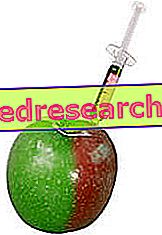Irritable Colon Syndrome - IBS
Irritable bowel syndrome is a disorder that affects the final portion of the large intestine, where the absorption / reabsorption of fluids and minerals from the faeces is completed.
This is not a real disease, but a functional disorder (or rather a syndrome).

It seems that the irritable bowel syndrome is mainly linked to the subject's psychological state and - precisely because it is not associated with pathological changes in the colon - almost always constitutes a diagnosis of exclusion with respect to organic diseases. In the absence of a clearly detectable cause, irritable bowel syndrome is often associated with impaired psychological stability.
The pathogenetic mechanism is controversial and still completely lacking in adequate scientific confirmation. On the other hand, it is possible that the colon, being provided with a neuro-hormonal regulation of its own but related to the brain, is the object of dysfunctions that affect the release or capture of certain chemical mediators. Some mechanisms likely to be compromised by irritable bowel syndrome are: alteration of serotonin release (responsible, among other things, for smooth muscle contraction), capillary vasoconstriction and mucosal immune regulation. In practice, brain activity changes the intestinal activity and can give rise to irritable bowel syndrome.
Other mechanisms "theoretically" capable of contributing, activating or worsening irritable bowel syndrome are nerve changes that affect intestinal contractility and visceral hyperalgesia (ie increased sensitivity to pain).
However, it cannot be excluded that the irritable bowel syndrome may depend on other factors still unknown, such as, for example, the typical inflammation of certain colitis.
Irritable bowel syndrome is NOT characterized by the diagnosis of exclusion ONLY due to the absence of organic alterations, but also because some diseases of the intestine (some almost harmless, others serious) can occur with similar symptoms; therefore it is worth performing all the tests necessary to exclude these pathological conditions.
However, readers who experience these symptoms (abdominal pain, constipation and / or diarrhea) should not be too alarmed. Keep in mind that, having an incidence of approximately 10-20% (of which 70% are women), the irritable bowel syndrome is the most widespread intestinal discomfort in the entire West and ABSOLUTELY NOT related to cancer colorectal!
Diet and Behavior
According to the clinical experience of many professionals, irritable bowel syndrome seems to improve significantly with the patient's emotional balance. This happens both in occasional circumstances (such as the holiday period), and in conjunction with certain anxiolytic drug therapies.
Another important fact is the one that affects the prevalence of ALVO TYPE of alteration, or the manifestation of constipation or diarrhea. While the former mainly affects women, the latter mainly affects men.
This is certainly a far from negligible detail, although it is not uncommon for both symptoms to alternate with the prevalence of one or the other component. We still remember a sprint that over 70% of cases concern women; consequently, the predominant picture is certainly the constipation associated with intestinal pain, sense of relief after evacuation and (sometimes) perception of progressive increase in abdominal circumference, with hints of tension and fullness; Often, those affected by irritable bowel syndrome with constipation also complain of goat feces, incomplete emptying, haemorrhoids and / or fissures.
In Irritable Colon Syndrome with Constipation, More Fibers and Water are needed
Unlike constipation due to a lack of fiber and water in the diet, constipation associated with irritable bowel syndrome is NOT DIRECTLY related to these two nutritional components. WARNING! This does NOT mean that the latter cannot improve with the aid of a suitable diet; in fact, it is important to keep in mind that the severity (so to speak) of symptomatological manifestations may have multiple etiology, consequently it may benefit from some dietary and / or behavioral corrections. The fact that there is no direct correlation indicates rather than, usually, even the intake of 30g of fiber and 1.5-2 liters of water a day fails to normalize intestinal function.
Furthermore, nutritional therapy is always INDISPENSABLE to differentiate between diet-dependent constipation from a psychogenic irritable bowel syndrome.
The Behavioral Aspect in Irritable Colon Syndrome with Constipation
As far as the behavioral aspect is concerned, many people suffer from irritable bowel syndrome because they are unable to understand the importance of certain spaces (and of certain times ...) throughout the day. Evacuation takes time (extremely subjective) and the intestine (which as we have said is extremely correlated with brain activity) "perceives" the frenzy of everyday life; sometimes the stimulus is scarcely identifiable and neglecting its onset means postponing it even for many hours. The more the stools remain in the colon, the more these become hard due to water re-absorption by the mucosa. Unfortunately, sometimes even the revenue of the necessary time does not seem to be enough because, excessively schematizing the schedules, the risk of ignoring the times of the physiological stimulus increases!
This explains why, thanks also to a lower level of general stress, there is often an improvement in symptoms during the holiday period and with the aid of anxiolytic drugs.
NB . Note how, despite having a totally different onset mechanism, the aggravation of dietary constipation and irritable bowel syndrome work in the same way. Therefore, the irritable bowel syndrome characterized ONLY by constipation, and the so-called IDIOPATHIC constipation are not completely differentiable.
Role of Fibers and Water in the Irritable Colon Syndrome with Diarrhea
If it is true that in irritable bowel syndrome with constipation the increase in fiber and water does not necessarily induce an improvement in evacuation, in the event of diarrhea the speech becomes even more complicated! Firstly, it is not possible to reduce the water intake with the diet and the drinks, since this is always necessary for the body; in parallel, diarrhea itself tends to decrease the absorption of liquids. Then, even in this case, there is no direct correlation between dietary fiber and gut motility; however, diarrhea of irritable bowel syndrome occurs even in the case of fasting. Sometimes, the frequency of evacuations is so high that it causes mucorrhea with a prevalence of mucus compared to the feces themselves.
Obviously, we reiterate that although the root cause has nothing to do with the diet, it is always a good idea to adapt the diet to the needs of the irritated colon. Giving up most of the fiber should not be advisable and sometimes it is also quite difficult to apply. Recall that among the various functions of the fibers, in addition to that of STIMULUS of the intestinal PERISTALSI, there are also the favor of satiety and the prebiotic one. Therefore, a permanent shortage of fiber is never a positive nutritional element. Moreover, some types of fiber, absorbing water, increase intestinal peristalsis but also the volume of the stools, with a positive effect on diarrhea.
Last but not least, we must keep in mind that diarrhea is often alternated with periods of constipation; this means that interrupting fiber intake too long to regain stool consistency could favor or aggravate subsequent constipation.
Other Important Dietary Factors in Irritable Colon Syndrome
The fact that we come to the diagnosis of irritable bowel syndrome by EXCLUSION, can hide certain situations of a quite different nature. This is the case, for example, with food intolerances to lactose and gluten sensitivity. These two conditions, usually diagnosable with specific tests, are sometimes almost impossible to recognize. In these cases, the first investigations can give false negative results, convincing the doctor that the patient is not intolerant (when in reality he is) and directing him towards the diagnosis of irritable bowel (actually absent). Therefore, it is always advisable to carry out ALL the diagnostic pathways of the case and implement (with the help of a dietitian) a " EXCLUSION " diet that is useful for recognizing any intolerances responsible for the symptoms. For example, you could eliminate all gluten sources from the diet for a few weeks (from two weeks to a couple of months), evaluate any improvements and, if not present, proceed to exclude even the major sources of lactose. Other possible intolerances due to symptoms of irritable bowel syndrome include salicylates and hypersensitivity to tyramine-rich foods.
Let's not forget that there are potentially irritating, astringent or laxative foods and drinks. While the former are able to favor both constipation and diarrhea (depending on individual susceptibility), the latter promote constipation and the latter determine the loss of stool consistency. Among the irritating products we distinguish above all: the spicy ones (chilli, pepper and other spices) and alcoholic beverages; astringents are: lemons, polished rice, unripe bananas, tea and medlars, etc. The laxatives include: warm milk (due to the presence of lactulose), very fiber-rich vegetables, bran and stimulants (such as caffeine). NB . There are other laxative active ingredients and are contained in certain products of plant origin.
For foods rich in stimulating nerves it is necessary to make a further clarification, namely that: since it is a disorder probably related to the subject's emotional-psychological state, as well as having a synergistic effect on intestinal smooth muscle contractions, caffeine can aggravate one state of unjustified alertness (anxiety) and also act directly on the primitive causes of irritable bowel syndrome.
Therapies and Motor Activity
Other Considerations on Irritable Colon Syndrome:
After having clarified the role of the diet in irritable bowel syndrome, it is necessary to at least mention the other possible methods to reduce the symptoms and favor the remission of the disorder.
At the discretion of the doctor, there are drugs that "could" favor the moderation of unwanted events. These are: anticholinergics (which decrease intestinal excitability, indicated in case of diarrhea), antidiarrheal (reduce visceral sensitivity, intestinal motility and mucous secretion, indicated in case of diarrhea), antidepressants (with indiscriminate application), prokinetics ( increase intestinal motility, indicated in case of constipation) and serotonergic drugs (intestinal receptor antagonists, indicated in both cases).
Finally, let's talk about physical exercise. This, in addition to NOT presenting any type of contraindication (paying attention to the level of body hydration in case of constipation), has a beneficial effect both on constipation and on diarrhea. In the first case. then, it is possible to notice a further articulation of the mechanism. Proceeding in order: 1) the natural massage of the intestine induced by physical movement, as well as diaphragmatic ventilation, favor intestinal transit 2) Thanks to the secretion of catecholamines (hormones responsible for hyper-excitability of the musculature, both smooth and striated), l intestine can benefit from further contractile support.
The effect on diarrhea instead is generic and, to tell the truth, it also affects constipation; this is the well-known anti-stress mechanism. It also has a multi-purpose action, in which the first system is purely concerned with the psychological sphere (doing sport allows you to "pull the plug") and the second involves the hormonal release of endorphins (natural opioids secreted by the pituitary gland in the brain).



